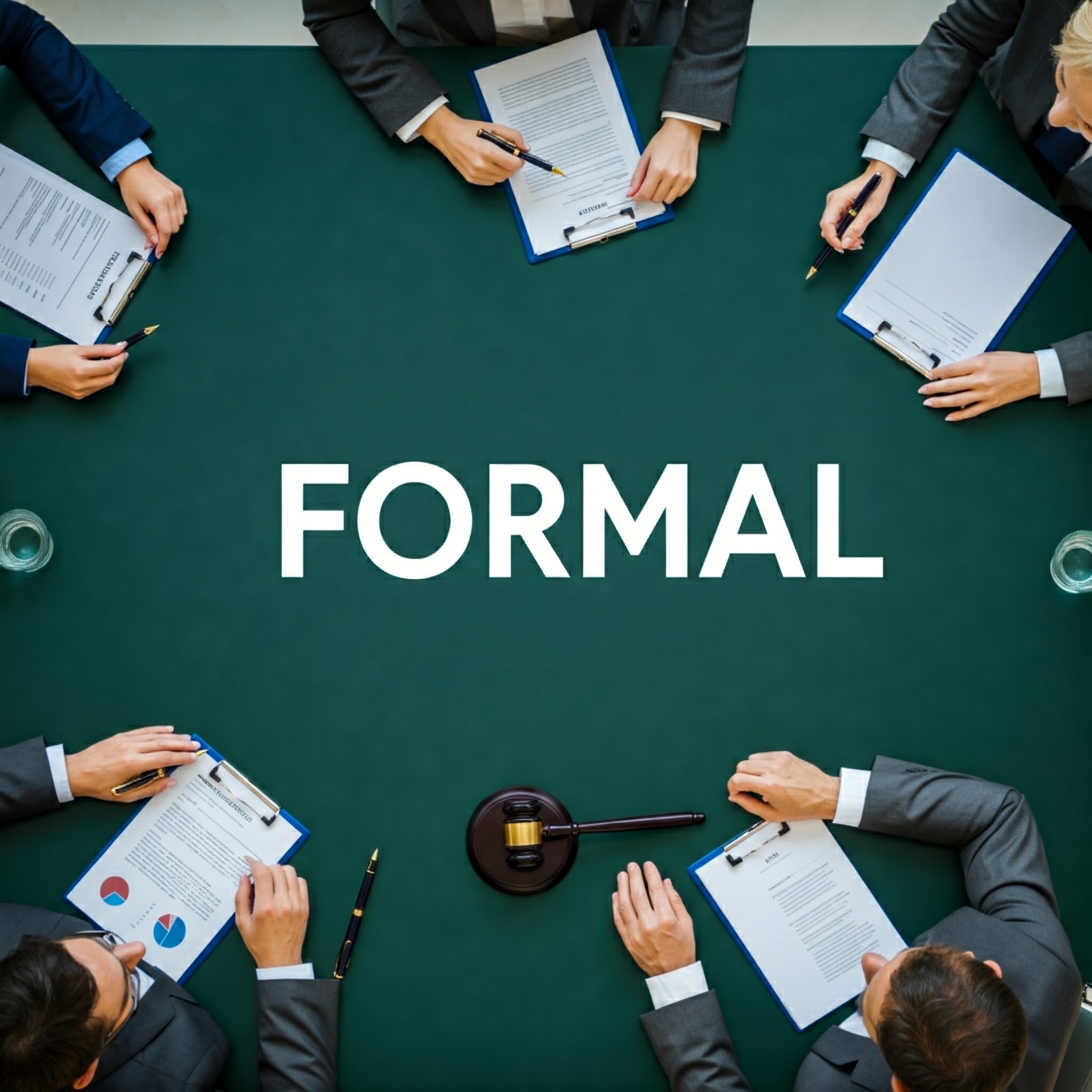Formal
Definition
Formal refers to something that follows established conventions, rules, or standards, particularly in behavior, attire, or communication. It also describes structured or official events and procedures.
Parts of Speech
- Adjective
Pronunciation
American English
- IPA Pronunciation: /ˈfɔːrməl/
- Respelling: FOR-muhl
British English
- IPA Pronunciation: /ˈfɔː.məl/
- Respelling: FAW-muhl
Etymology
The word "formal" originates from the Latin "formalis," meaning "pertaining to form," derived from "forma," meaning "shape or structure." It was adopted into Middle English in the 14th century, maintaining its sense of adherence to formality and structure.
Derivatives
- Formally (adverb)
- Formalism (noun)
- Formalize (verb)
- Formality (noun)
- Formalwear (noun)
Synonyms
- Official
- Conventional
- Proper
Antonyms
- Casual
- Informal
- Relaxed
Usage
The term "formal" is often used in contexts involving etiquette, attire, and procedures. For example, "The event requires formal attire," or "She wrote a formal letter of complaint."
Related Terms
- Etiquette: Rules governing polite behavior.
- Protocol: Official procedures or guidelines.
- Structure: The arrangement or organization of elements.
Detailed Definitions
Adjective
- Adhering to established rules or conventions: Refers to behavior, dress, or communication that follows specific standards.
- Example: "The ambassador delivered a formal speech at the ceremony."
- Characterized by structure or official status: Refers to events, documents, or settings that are organized and regulated.
- Example: "The negotiations began with a formal agreement."
- Suitable for important occasions: Refers to attire or actions appropriate for significant events.
- Example: "He wore a tuxedo for the formal dinner."
formal



🇨🇳 Mandarin Chinese
- 正式
- IPA: /ʈ͡ʂəŋ˥˩ ʂɨ˥˩/
- English Respell: zhèngshì
- 礼貌
- IPA: /leɪ˧˥ maʊ˧˥/
- English Respell: lǐmào (This is more similar to the term "polite" but it can also mean formal in certain contexts.)
🇮🇳 Hindi
- औपचारिक
- IPA: /oːpət͡ʃaːrɪk/
- English Respell: aupachaarik
- अधिकारिक
- IPA: /əd̪ʱɪkaːrɪk/
- English Respell: adhikaarik
🇪🇸 Spanish
- Formal
- IPA: /forˈmal/
- English Respell: formal
- Oficial
- IPA: /oˈfiθjal/
- English Respell: oficial
🇫🇷 French
- Formel
- IPA: /fɔʁ.mɛl/
- English Respell: formel
- Officiel
- IPA: /ɔ.fi.sjɛl/
- English Respell: officiel
🇦🇪 Arabic (Modern Standard)
- رسمي
- IPA: /ˈræsmiː/
- English Respell: rasmi
- صارم
- IPA: /ˈsæːrem/
- English Respell: saareem
🇧🇩 Bengali
- আনুষ্ঠানিক
- IPA: /anusthanik/
- English Respell: anushthanik
- প্রামাণ্য
- IPA: /pramānya/
- English Respell: pramanya
🇷🇺 Russian
- Формальный
- IPA: /fɐrˈmalʲnɨj/
- English Respell: formal'nyy
- Официальный
- IPA: /ɐfʲɪˈt͡sɨalʲnɨj/
- English Respell: ofitsial'nyy
🇵🇹 Portuguese
- Formal
- IPA: /foʁˈmal/
- English Respell: formal
- Oficial
- IPA: /ɔfiˈsiɐɫ/
- English Respell: oficial
🇮🇩 Indonesian
- Formal
- IPA: /fɔrmal/
- English Respell: formal
- Resmi
- IPA: /rəsmi/
- English Respell: resmi
🇩🇪 German
- Formell
- IPA: /fɔʁˈmɛl/
- English Respell: formell
- Offiziell
- IPA: /ɔfˈtsiːzi̯eːl/
- English Respell: offiziell
🇯🇵 Japanese
- フォーマル
- IPA: /ɸoːmaɾɯ/
- English Respell: foomaru
- 公式
- IPA: /koːʃɪkɯ/
- English Respell: kōshiki
🇻🇳 Vietnamese
- Chính thức
- IPA: /cɪnɲ˦ˀ˥ tʰuc˧˩/
- English Respell: chính thức
- Trang trọng
- IPA: /t͡ɕaːŋ˧˩ˀ˨ tɤ˧˩ˀ˨/
- English Respell: trang trọng
🇰🇷 Korean
- 공식적인
- IPA: /kʌnɕikt͡ɕʌkʌn/
- English Respell: gongshikjeog-in
- 정식의
- IPA: /t͡ɕʌŋɕikt͡ɕʌɪ/
- English Respell: jeongsik-ui
🇹🇷 Turkish
- Resmi
- IPA: /ɾesmi/
- English Respell: resmi
- Formel
- IPA: /fɔʁˈmel/
- English Respell: formel
🇵🇰 Urdu
- رسمی
- IPA: /rɪsmi/
- English Respell: rasmi
- فارمال
- IPA: /fɑːrmɑːl/
- English Respell: farmal





